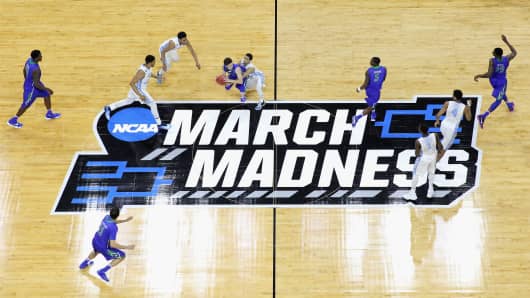The NCAA: An Incidental Cartel
The NCAA operates as a cartel, or a group of firms that work together in a market to exercise monopoly power over a market. Using this, they can assign output levels to members, divide profits, and block out competition from any who are not in the cartel. Yet while many argue that it's a money-grubbing cartel that misuses its monopoly, it was not actually formed at first in order to monopolize the market. Some call it an incidental cartel, one that was formed because of different reasons.
Before the NCAA was founded, there was no single organization that controlled how college games were run. For soccer, each college had their own set of rules for how the game was played, and one game between Harvard and McGill played in Montreal was split half in half, with one half of the game played under Harvard's rules and the other under McGill's. This lack of consistent rules made it hard to enforce any one set of rules, and soccer became increasingly violent.
In the 1905 season alone, 18 students were killed and 159 suffered serious injuries in the sport of soccer alone. Representatives from 13 colleges met to adopt a set of rules and one that would promote safer gameplay, and the organization in charge of that was the NCAA. Within one year, it had all teams playing on one set of rules.
Although initially formed as an incidental cartel, and not an evil money-grubbing power hungry cartel, the NCAA has shown some signs of possibly converting to the dark side. In the early 1980s, legislation was first introduced to vastly increase funding for women's sports. At first, the NCAA was against it, but soon it changed its strategy and used its power to get members already in the existing organization, AIAW, to switch to the NCAA. The AIAW soon died. One of the main issues today is that the NCAA refuses to pay athletes, under the argument that "players would be corrupted by being salaried", and that's after the NCAA explicitly rejected any profit motives.
http://smartfootball.com/grab-bag/is-the-ncaa-a-coercive-cartel#sthash.77cTmwOz.dpbs
https://books.google.com/books?id=2KVYDwAAQBAJ&pg=PT403&lpg=PT403&dq=ncaa+incidental+cartel&source=bl&ots=u9Yfk_U_61&sig=ACfU3U3Ms8SCSgyWse0u095MLBnOiGspCg&hl=en&sa=X&ved=2ahUKEwiu3azhg7_hAhUEIDQIHfYKBkgQ6AEwCXoECAoQAQ#v=onepage&q=ncaa%20incidental%20cartel&f=false
https://www.pbs.org/wgbh/frontline/article/does-the-ncaa-rule-college-sports-like-a-cartel/


Great post Kevin! The NCAA does seem to have become a lot more corrupt recently, but I was intrigued by the fact that it incidentally became a cartel. Although the NCAA's men basketball tournament in 2013 generated 1.15 billion through advertisements, none of that money went to the athletes. Instead, they were spread to the NCAA, schools, staff, coaches, and everybody else who organized it. Division 1 athletes spend around 40-60 hours per week training, but they are still not considered employees. This is often more time than many full time jobs! The NCAA exploits them by saying these athletes are "amateur" and do not need a salary in college. The business conducting in the NCAA has become unethical.
ReplyDeletehttps://www.thenation.com/article/ncaa-makes-billions-and-student-athletes-get-none-it/